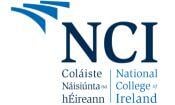
There are many reasons why someone would choose to do a Higher Certificate (Level 6) after Leaving Certificate, rather than go directly onto an Honours Degree (Level 8) course.
Keep Your Options Open
"My advice would be to complete both your top-10 Level 8 courses and your top-10 Level 6/7 courses,” says Karen Campbell, NCI’s Schools Liaison Officer. “Remember, you might do better than you expect, so do put your absolute favourite course first, don't let the points you think you might get influence that decision.”
Karen continues: “Filling in the Higher Certificate in Business at NCI (NC103) in the Level 6/7 column gives you a second chance to follow that path, even if you don't get the points to go straight to a Level 8 degree.
“You could end up, on CAO results day, getting offered a course that isn't your favourite but is also something you're interested in, like maybe a Level 8 course in Maths, and also get offered the Higher Cert in Business. You can then decide, do you want to go straight to a degree that wasn't your first preference?
Who Would My Classmates Be?
Business lecturer Dave Cormack tells us: “The Higher Certificate in Business attracts all sorts of people.
“We have some students who already know what they want to do for a living, but see the advantage of a strong grounding in Business before they embark on opening a nail salon, for example, or taking an apprenticeship in the family trade.
“We have some students who are very focused on the area of business they want to specialise in, who realised their Leaving Certificate results would not provide them the points they needed to embark directly on a Level 8 programme, and a Level 6 gets them there with just one additional year’s study.
“And we have some students who are not sure what it is they want to specialise in, but want a taste of every aspect of Business – and an experience of college life – before they make up their minds.”
Did you know? Students who complete the Level 6 Higher Certificate in Business can potentially gain entry into year two of the Level 8 BA (Honours) in Business degree. Students can now apply for the Higher Certificate in Business through CAO Available Places.
Karen interrupts to say, “On Dave’s last point, if you really don’t know what you want to do, you really should consider a PLC course or a Level 6 programme – if you drop out at the end of the first year of a Level 8 degree because you realise it’s not for you, you will not qualify for the Free Fees Initiative, or any SUSI grant you may be receiving, to start again on another course, until you reach second year – for many students, having to self-fund a year of college is not affordable. So again, give yourself every chance to find a course you really want to do.”
Dave adds, “Most of our Higher Cert students actually do choose to progress onto an Honours Degree course at NCI”
Meet Cillian
Cillian Cosgrave did the Higher Certificate, and is now completing an Honours Degree in Business: “With me, I knew I wanted to study Business, but I didn’t know what area I wanted to specialise in. Like Adam said, the Higher Cert gives you a taste of everything. It also gives you a chance to grow up a bit, to adjust to the difference between school life and college life. Once you have your Higher Cert, you can apply to go directly into second year of the degree – this means, it will take me 4 years rather than 3 to get my BA Hons, but I had such an advantage going into second year with two years’ work behind me.”
Location, Location, Location
For Cillian, one of the things that attracted him to NCI was the central location.
“Besides the fact that the campus location means it’s easy to get to NCI, you are literally in the heart of the IFSC, surrounded by the sort of companies you’d like to work for when you leave college,” says Adam. “Between work placements as part of the course, and all the work the Careers Service does to help you build your CV and connect you with potential employers around you, through mock interviews and work placements, NCI literally places you well to succeed.”
Size Matters
“I also liked that NCI is a smaller college,” says Cillian. “I reckoned that if I went to a smaller college, I would be able to get more out of my lectures and be able to get help when required from my teachers, which I thought was very important. And this has turned out to be the case. At NCI, you get to know all your classmates, and it is easy to have lots of direct contact with lecturers.”
What Next for Cillian?
Cillian explains, “Through my course, I have already done work experience with a company I really like. This also means I am a ‘known quantity’ to them, so that when I apply to their graduate programme, I immediately go to the second interview stage. While I am also applying to other companies, I am hopeful of joining their graduate programme. Ultimately, I see myself returning to do a Master’s, but I think a graduate programme will provide me with broad experience and an understanding of the working world.”
Cillian completed the Higher Certificate in Business at NCI (NC103) after adding it to his Level 6/7 CAO preferences. If you have any questions about this course, you can get in touch with our School Liaison Officer Karen by emailing karen.campbell@ncirl.ie and she will be happy to help.










